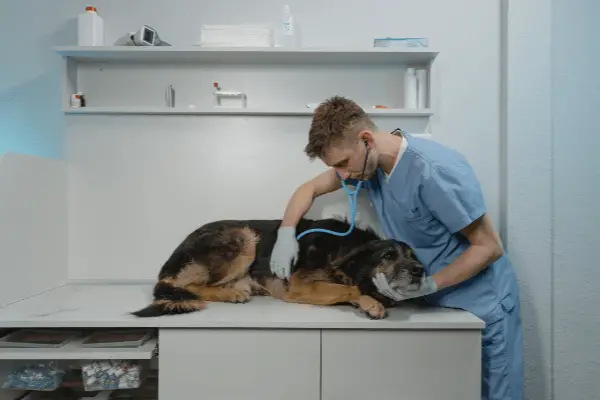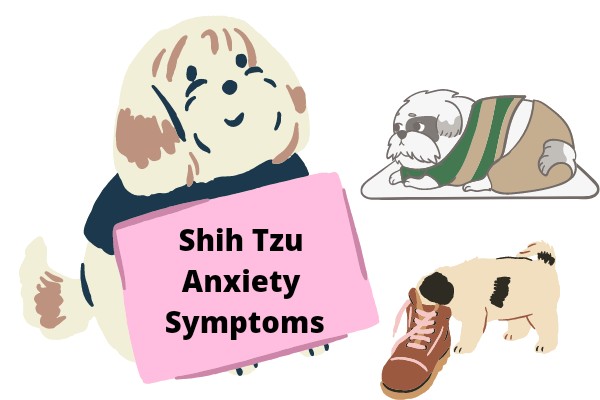10 Common Older Beagle Health Issues

Are you a happy owner of a wise and beloved older beagle? As much as we adore our senior furry friends, there are certain health issues that come hand in hand with aging- and it’s important to know what to keep an eye out for.
That’s why we’ve put together this brief guide on the common health problems that older beagles may face, and some tips on how to ensure their golden years are as happy and comfortable as possible.
So grab a cup of tea, and let’s dive in!
Older Beagle Health Issues
As Beagles age, they may develop various health issues just like any other breed.
Some of the common health issues that older Beagles may face include kidney problems, diabetes, cancer, arthritis, heart problems, and cognitive dysfunction syndrome.
They may also develop bladder or bowel problems, which can make house training difficult.
It’s important to keep an eye on your senior Beagle’s health and consult with a veterinarian if you notice any concerning symptoms or changes in behavior.
Regular check-ups and preventive care can also help keep your senior Beagle healthy and happy in its golden years.
Learn more about identifying a sick beagle.
Common older beagle health issues
The following are some of the most common older beagle health issues:
1. Joint problems
Joint problems are a common health issue in older beagles. Arthritis, hip dysplasia, and patellar luxation are some of the leading causes of joint problems in older beagles.
These conditions can cause pain, stiffness, lameness, and difficulty in movement in older beagles.
Treatment options include medication, weight management, physical therapy, and surgery in severe cases.
It’s essential to identify the signs of joint problems early on to prevent them from worsening.
Regular check-ups with a veterinarian and maintaining a healthy diet and exercise routine can help prevent joint problems in beagles.
Learn more about why beagles shake.
2. Cognitive dysfunction syndrome
Cognitive dysfunction syndrome (CDS) is a common old-age Beagle health issue that also affects other senior dogs.
It is characterized by a decline in cognitive abilities such as memory, learning, and awareness.
The exact cause of CDS is not known, but it is believed to be linked to neurodegenerative changes in the brain.
The signs of CDS in Beagles may include wandering aimlessly, disorientation, confusion, decreased interaction with family members, loss of housetraining, and changes in sleep patterns.
If you notice any of these signs, it’s important to take your Beagle to a veterinarian who can diagnose CDS and rule out other health issues.
There is no cure for CDS, but there are various treatments that can help manage the symptoms and slow down the progression of the disease.
Medications, supplements, and lifestyle changes such as cognitive stimulation and a healthy diet can be recommended by your veterinarian to improve your Beagle’s quality of life.
Early diagnosis and treatment can also help to slow down the progression of the disease.
3. Heart disease
Heart disease is one of the common health issues that affect older beagles. It can be caused by a variety of factors, including genetics, poor nutrition, or infection.
Some common signs of heart disease in dogs include coughing, difficulty breathing, fatigue, and a decrease in appetite or activity level.
Treatment options may include medication, diet changes, and exercise modifications.
It is important to consult with a veterinarian for proper diagnosis and to develop a personalized treatment plan for your beagle.
Regular check-ups and monitoring of your beagle’s health can help catch heart disease early, increasing the likelihood of successful treatment and a longer, healthier life for your furry friend.
4. Kidney disease
Kidney disease is a common health issue in senior beagles. It refers to the gradual loss of kidney function and is commonly caused by factors such as aging, genetics, and underlying medical conditions.
The signs of kidney disease include increased thirst and urination, poor appetite, weight loss, and lethargy.
Treatment options vary depending on the severity of the condition but may include dietary changes, medication, and in severe cases, dialysis or kidney transplant.
Regular check-ups with a veterinarian and early intervention can help manage the condition and improve the quality of life for beagles with kidney disease.
5. Diabetes
Diabetes in beagles is one of the common health issues encountered in older beagles.
It is caused by an inability to produce or use insulin properly, leading to high blood sugar levels in the body.
The signs of diabetes in beagles include excessive thirst and urination, increased appetite, weight loss, and lethargy.
If left untreated, it can lead to serious complications such as cataracts, blindness, and kidney disease.
Treatment usually involves insulin injections, along with a carefully balanced diet and regular exercise.
It is important to monitor blood sugar levels regularly and work closely with a veterinarian to manage this condition effectively.
6. Cancer
Cancer is a common health issue in Older Beagles, and it is the leading cause of death in older beagles.
It can be caused by genetic factors and environmental factors. Some common types of cancer in dogs include lymphoma, stomach cancer, and other types of tumors.
Signs of cancer in beagles include weight loss, lethargy, loss of appetite, and changes in behavior.
Treatment options for beagles with cancer include surgery, chemotherapy, and radiation therapy.
However, it is important to note that not all forms of cancer can be cured, and it is important to work closely with a veterinarian to determine the best course of treatment.
7. Skin issues
Skin issues are one of the common health issues in older beagles. These issues can be caused by a wide range of factors, such as genetics, environmental factors, allergies, and autoimmune diseases.
Some of the common skin issues in beagles include interdigital cysts, hot spots, and autoimmune skin diseases.
Signs of skin issues in beagles may include excessive scratching, hair loss, scabs, rashes, and redness.
Treatment for skin issues in beagles depends on the underlying cause of the problem.
Treatment options may include medications, topical creams, and changes in diet or environment.
If you suspect that your beagle is suffering from a skin issue, it is important to consult with a veterinarian for an accurate diagnosis and appropriate treatment.
They may also recommend preventative measures to help reduce the risk of further skin issues in the future.
8. Dental problems
Dental problems, specifically periodontal disease, are one of the most common health issues seen in older Beagles.
The disease is caused by a buildup of plaque and bacteria on the teeth and gums, which can lead to inflammation, infection, and eventually tooth loss.
Signs of dental problems in Beagles include bad breath, loose or missing teeth, difficulty eating, and inflamed or bleeding gums.
Treatment options include professional dental cleanings, tooth extractions if necessary, and regular at-home dental care such as teeth brushing and dental chews.
Proper dental maintenance is crucial in preventing dental problems in Beagles and promoting their overall health and well-being.
9. Vision and Hearing loss
Vision and hearing loss are common age-related health issues that beagles can experience in their senior years.
The causes of vision loss can include glaucoma, cataracts, macular degeneration, and other eye diseases.
Signs of vision loss may include bumping into objects, reluctance to go downstairs or through doorways, and increased anxiety or disorientation.
Treatment for vision loss may include surgery, medication, or environmental modifications to help the dog navigate its surroundings more easily.
Hearing loss, on the other hand, can be caused by a variety of factors, including ear infections, genetics, and exposure to loud noises.
Signs of hearing loss may include a lack of response to verbal cues, increased startle response, and general disorientation.
While there is no cure for hearing loss in dogs, there are strategies that can help to mitigate the effects of the condition, such as training using hand signals and other non-auditory cues.
If your beagle is experiencing vision or hearing loss, it is important to seek veterinary care to determine the underlying cause and develop an appropriate treatment plan.
In addition, environmental modifications such as the use of non-slip flooring and placement of furniture and obstacles can help to improve the quality of life for a senior beagle with sensory decline.
10. Excessive urination
Excessive urination in beagles is one of the common health issues encountered in older beagles. This condition is also known as urinary incontinence.
The causes of excessive urination in beagles may include urinary tract infections, incontinence due to aging, hormonal imbalances, or spinal cord injuries.
Signs of excessive urination in beagles may include dribbling or leaking urine, frequent urination, or having accidents inside the house.
Treatment options may include medication, surgery, or dietary changes.
It is important to consult a veterinarian for an accurate diagnosis and treatment plan.
Ways to take care of older beagles to prevent health issues
As beagles age, it is important to take proper care of them to prevent health issues.
Here are some common ways to take care of older beagles:
- Regular vet check-ups: Schedule regular check-ups with your vet to ensure that your beagle is in good overall health and to catch any potential health issues early.
- Balanced diet: Feed your beagle a balanced diet to maintain a healthy weight and prevent obesity-related health issues.
- Exercise: Keep your beagle active through regular exercise to maintain muscle tone and prevent joint issues.
- Dental care: Regularly brush your beagle’s teeth and schedule professional dental cleanings to prevent periodontal disease.
- Geriatric screenings: Schedule geriatric screenings with your vet to check for age-related health issues such as arthritis, kidney disease, and cancer.
- Vaccinations: Keep your beagle up to date on vaccinations to prevent infectious diseases.
- Mental stimulation: Provide mental stimulation through toys, puzzles, and other activities to prevent cognitive decline and keep your beagle engaged.
- Preventive medications: Use preventive medications to prevent issues such as flea and tick infestations and heartworms.
- Regular grooming: Regularly groom your beagle to maintain skin and coat health, and to check for any lumps, bumps, or skin issues that may need veterinary attention.
By following these tips, you can help keep your older beagle healthy and happy for years to come.
Frequently Asked Questions
How can I help my older Beagle maintain a healthy weight?
Maintaining a healthy weight is important for older Beagles to prevent obesity, which can lead to joint problems and other health issues. You can help your Beagle maintain a healthy weight by providing a balanced diet that is low in fat and calories and by ensuring they get regular exercise. You can also consult with your veterinarian for specific recommendations based on your Beagle’s age, weight, and overall health.
What should I do if I notice my older Beagle is having difficulty walking or getting up?
Difficulty walking or getting up can be a sign of arthritis or other joint problems that are common in older Beagles. If you notice any of these symptoms, it’s important to seek veterinary care as soon as possible. Your veterinarian may recommend medication to manage pain and inflammation, as well as physical therapy or other treatments to improve your Beagle’s mobility.
How can I care for my older Beagle’s dental health?
Dental problems are common in older Beagles, so it’s important to care for their teeth and gums to prevent issues like gum disease and tooth loss. You can help maintain your Beagle’s dental health by regularly brushing their teeth, providing dental treats and toys, and scheduling regular dental cleanings with your veterinarian.
What can I do to keep my older Beagle mentally stimulated?
Mental stimulation is important for older Beagles, as it helps keep their minds active and can prevent boredom and depression. You can keep your Beagle mentally stimulated by providing interactive toys and puzzles, teaching them new tricks, and taking them on regular walks and outings to new places.
What steps can I take to ensure my older Beagle stays comfortable in their golden years?
As Beagles age, they may require more specialized care to ensure they stay comfortable and healthy. You can help ensure your older Beagle stays comfortable by providing a soft and supportive bed, minimizing their stress and anxiety, and seeking veterinary care as soon as you notice any signs of illness or discomfort.
Learn more about health issues in beagles.
Conclusion
In conclusion, while older Beagles may experience certain health issues, there are a variety of ways to help keep your furry friend happy and healthy in their golden years.
Regular check-ups with your veterinarian, a balanced diet, and plenty of exercises can all play a vital role in maintaining your Beagle’s health and happiness.
And remember, just like any other family member, your Beagle deserves all the love and care you can give them!


![Do Havanese Have Health Problems [Answered] Do Havanese Have Health Problems](https://petcreeks.com/wp-content/uploads/2023/02/Do-Havanese-Have-Health-Problems-768x555.jpg)



